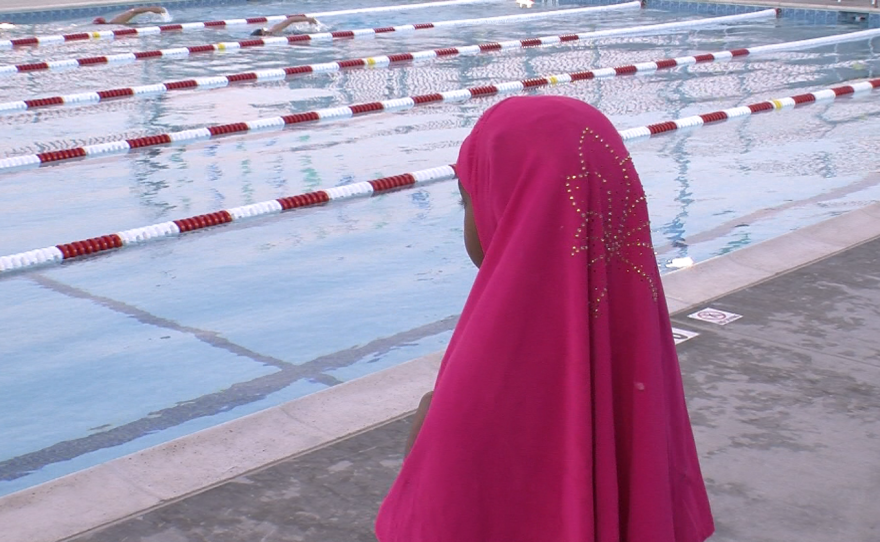Imagine a greenhouse. Glass on all sides. A glass barrel ceiling. Now put a pool in it. That's the aquatic center at the Copley-Price Family YMCA on the border of City Heights and Kensington-Talmadge. It's impressive, but it poses a problem for the gym's Muslim members.
The group United Women's East African Support Team met with YMCA staff this week to see if the new facility will offer enough privacy for Muslim women who want to swim.
The Y opened its old pool to the women after hours beginning in 2012, because they didn't feel comfortable swimming in front of men. Their religion requires they dress modestly, and even tight-fitting Islamic swimsuits that cover their limbs and heads can make them feel uncomfortable in mixed company.
Though the classes would still begin once the gym has cleared for the night, the new pool is partially visible from the street and common areas.
"I was expecting it to be a little more covered than this," said Amina Sheik Mohamed when she first saw it. Mohamed is a senior manager at the UC San Diego Center for Community Health. Like most of the women, she's a U.S. citizen but came to the United States from Somalia.
The women are considering pooling their money or finding a donor to pay for retractable shades on the most exposed wall.
Faduma Adam Haji, 16, said it's important they find a solution.
"It's a place that we can get out our stress," said Haji. "And exercise-wise, especially the moms, they just don't get exercise. Sometimes it's the only place where we can exercise and it's really saved us a lot in terms of health."
Haji added that she didn't expect to swim again once she became a pre-teen.
"I was really stoked because I was like, 'Finally after all these years I'm going to be able to go swimming. I can't believe they did this for us,'" Haji said.

The YMCA faced criticism over the classes when KPBS aired a story on them in 2012. Some said the accommodation was discrimination against the gym's other members.
Professor of law Andrea Freeman, now at the William S. Richardson School of Law in Hawaii, said at the time the class does not violate anti-discrimination laws.
Adina Batnitzky, an associate professor of sociology at the University of San Diego, applauded the women for "taking their health into their own hands."
“Yes this is an issue of inclusion and diversity, but it’s also an issue of public health,” she said. “We want to get these women moving.”
Batnitzky said Islam has doctrines about modesty that apply to both men and women, which is what keeps the women from participating in a co-ed swim class. She added that because many of the women are East African, they are at higher risk for hypertension and diabetes.
"It's at a really diverse epicenter of San Diego," Holets said. "It has a lot of different people from a lot of different backgrounds and the Y is for everybody. We want to make sure that our program reflects that diversity."








